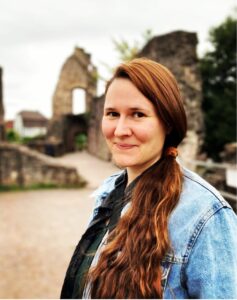« Visualizing Resistance: The Traveling Graffiti “Las Cuchas Tienen la Razón” and the Ghostly Presence of Forcibly Disappeared Colombians in Europe »
Research Area 3 – Objects, Traces, Mapping: Everyday Experience of Spaces
 My research broadly examines how state and non-state actors, as well as victim-survivors themselves, negotiate concepts of collective reparation for gendered, intersectional, and relational harm. I focus in particular on the possibilities and limitations of collective reparations within official processes of victim subject recognition. Using a relational ontological lens, I explore how frameworks of collective victimization are constructed and contested within transitional justice discourses and beyond and particularly in relation to territorial memory, art, and resistance in the context of Colombia’s urban territorial peace. My work is grounded in critical, decolonial, queer, and feminist approaches to transitional justice, reparations, gender, and human rights. Between 2022 and 2024, I collaborated closely on participatory documentary projects with a women’s searcher collective and an LGBT group in Medellín. One of these projects is currently being re-edited and is planned for submission to a human rights film festival.
My research broadly examines how state and non-state actors, as well as victim-survivors themselves, negotiate concepts of collective reparation for gendered, intersectional, and relational harm. I focus in particular on the possibilities and limitations of collective reparations within official processes of victim subject recognition. Using a relational ontological lens, I explore how frameworks of collective victimization are constructed and contested within transitional justice discourses and beyond and particularly in relation to territorial memory, art, and resistance in the context of Colombia’s urban territorial peace. My work is grounded in critical, decolonial, queer, and feminist approaches to transitional justice, reparations, gender, and human rights. Between 2022 and 2024, I collaborated closely on participatory documentary projects with a women’s searcher collective and an LGBT group in Medellín. One of these projects is currently being re-edited and is planned for submission to a human rights film festival.
During my fellowship at CEFRES, I will explore the transnational dimensions of memory activism through the traveling graffiti “Las cuchas tienen la razón”, originally created by youth graffiti artists and women searchers in Medellín, Colombia. The project investigates how this visual intervention, symbolizing territorial resistance and youth and women-led struggles for truth, justice, and reparations, has been reinterpreted within the Latin American diaspora in European cities such as Vienna, Berlin and London. To study these translocated territorial memories in traveling graffiti, I adopt an exploratory methodology using the metaphor of ghosts. “Ghost ethnography” offers a conceptual framework to examine how trauma and absence are inscribed on bodies and urban spaces, particularly through muralism and graffiti. These forms of street art function as living archives of resistance, often overlooked in mainstream historiography and ethnography, yet central to grassroots memory practices. I will complement this with semi-structured interviews conducted with graffiti artists and women searchers.
At CEFRES, I aim to contribute primarily to Research Area 3, “Objects, Traces, Mapping: Everyday Experience of Spaces.” During my stay, I will present findings from my PhD research and screen the upcoming participatory documentary “Women Walking for Truth – Transforming Voices and Territorial Resistance” (2025).
CV
I hold a Master’s in Philosophy (2019) from Goethe University (Frankfurt) and a Master’s in International Studies / Peace and Conflict Research (2020) from the Technical University of Darmstadt. In 2024, I taught courses on feminist theory, climate repair, and art-based methodologies as a Global Teaching Fellow at the Department of Political Science and Global Studies at Universidad de los Andes (Bogotá). In 2025, I was a visiting PhD researcher at the Department of Gender Studies at the London School of Economics and Political Science and at the Department of Political and Social Sciences at the European University Institute (Florence).
